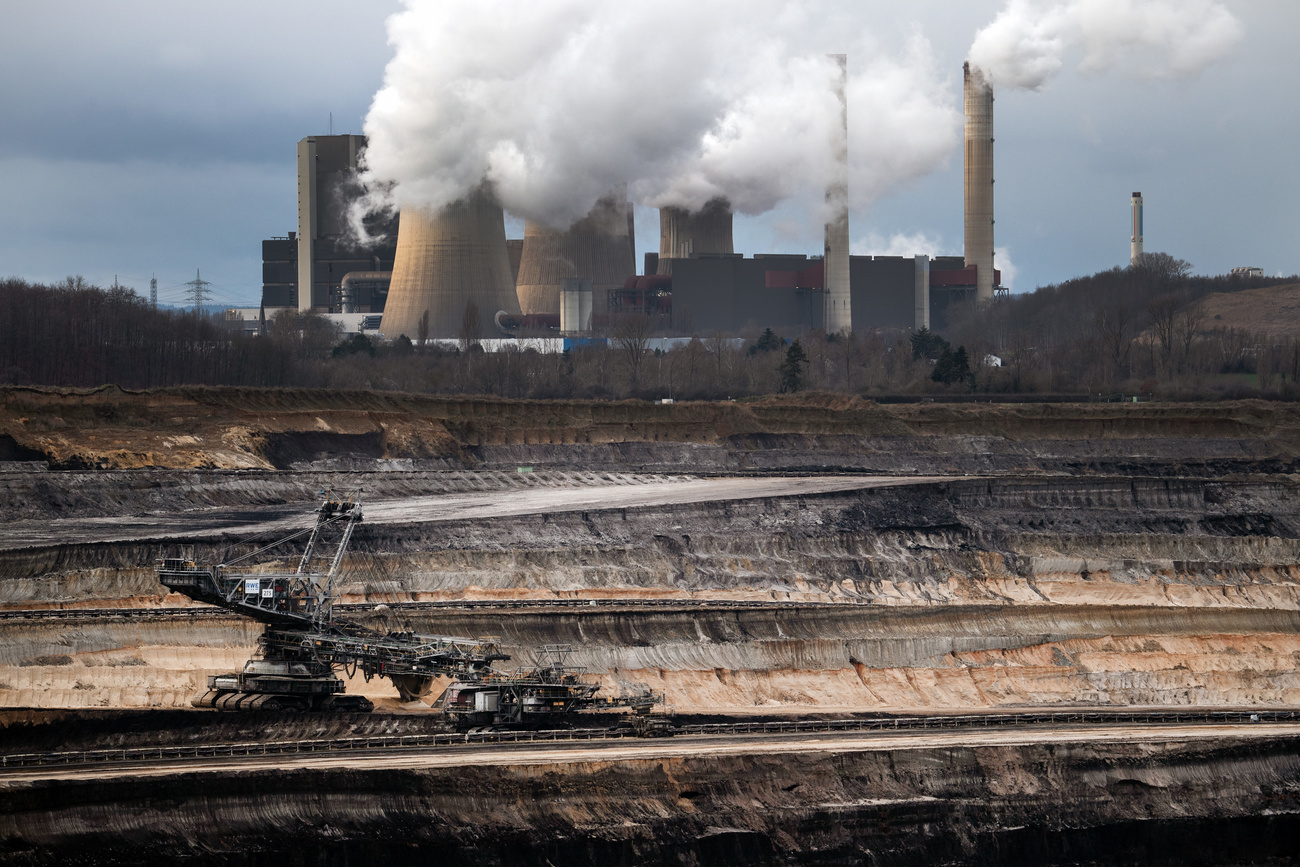
Making the Swiss financial sector deliver on climate promises

Elgin Brunner rubs shoulders with the Swiss banking elite. But it’s an open question whether her plea for the financial sector to divest from oil and gas will rub off.
Brunner, a director at World Wildlife Fund Switzerland, spoke directly to captains of Swiss finance, industry and government officials at a recent sustainability forum in the northern city of Winterthur.
She didn’t wait long to address the elephant in the room.
“We see a Swiss financial industry that finances, at the moment, a climate warming of four to six degrees Celsius,” she said, referring to a 2017 report sponsored by the Swiss government.
The comment followed a keynote address by Jörg Gasser, the CEO of the Swiss Bankers Association (SBA), who vowed that the industry would do good. “We don’t want to be a problem, but a part of the solution,” he said. “That’s why we need – for this transition from a greenhouse gas heavy to a sustainable economy – a strong financial industry.”
The SBA published a position paper earlier this year in which the association laid out how banks could achieve a leading position in sustainable finance. Not surprisingly, the association opposes government interference, instead advocating for market-driven initiatives. Defending the banks’ stance, Gasser told the forum that “regulation kills innovation”.
The forum took place on October 1. It was organised by LifefairExternal link, a company that hosts several events in Switzerland each year to promote a sustainable economy. The largest annual event is the Swiss Green Economy Symposium (SGES). SWI swissinfo.ch was the media partner at SGES20, and focused its reporting on Smart Cities.
Brunner, who is responsible for Transformational Programmes at the WWF, welcomed Gasser’s pledge, but said the sector still had its work cut out to implement measures that would have a real impact on reducing greenhouse gas emissions.
She said its progress was “too slow”. Updated figures of the Swiss financial sector’s contribution to global warming are expected to be made public in November this year. The WWF expert said the report would show whether there had been change for the better but remained “sceptical”.

Yet Brunner says whatever the outcome, the environmental organisation will remain in dialogue with Swiss bankers and other players in the financial sector , to be collaborative rather than militant. Back in her Zurich office a few days later, she sums up the WWF’s vision: “Engage them, talk to them, hold them accountable.”
Calm and thoughtful, with grey glasses matching her shoulder-length hair, she has the air of an academic, which was a path she followed early in her career. She completed a PhD in political theory at the University of Vienna, and worked as a researcher at the federal technology institute ETH Zurich.
Determined to have a positive impact on the world and taking advantage of her ability to deal with complex issues, she took up a career in sustainability. She worked in sustainable asset management and consulting before joining the WWF.
“We spend so much time and energy in our working lives, it’s important to have a purpose,” she says, explaining her motivation.
What worries Brunner the most about the financial industry is its unwillingness to divest from fossil fuels.
According to the latest Banking on Climate Change report, co-authored by a group of NGOs, both Credit Suisse and UBS provided financing to fossil fuel companies for respectively $74.3 billion (CHF67.56 billion) and $35.1 billion (CHF31.88 billion) over the 2016-2019 period that followed the adoption of the Paris Agreement.
It matters, she says, because investments made in the Swiss financial sector generate an estimated 1,100 million tonnes of CO2 equivalents per year. A number which, according to a study by Climate Alliance SwitzerlandExternal link, is 22 times higher than the country’s domestic emissions.
Given the clear political goal of reaching net zero emissions by 2050 in Switzerland, and the looming cost of inaction related to assets at risk of losing their value, she argues that members of the financial industry are not acting decisively enough.
An inertia which she thinks reflects financial actors’ “reluctance to understand their power. Because with this power, comes the responsibility to act”.
An argument Brunner often hears when discussing divesting from fossil fuels is that if one investor steps out, another steps in. The investee company feels no pressure to change its behaviour. It would therefore be better to keep engaging with the firm, than to pull the plug.
While she recognises that this argument is true for other industries, she says the theory does not apply in the case of fossil fuels. The scientific evidence, she explains, tells us to just “leave them in the ground.”
Reducing CO2 emissions is just the first step. What is needed then, she says, are investments to support a transition to and innovations for a net-zero economy and society, such as carbon sinks and negative emission technologies. “Only through reduction, by 2050 we’ll still be nowhere.”
On an upbeat note, Brunner says awareness of climate change has grown in the financial sector, especially in the last couple of years. She credits environmental movements and protests for putting pressure on the economic sector and government.
The latest numbers published this year by the Swiss Sustainable Finance (SSF) association bear this out. They show a record CHF1,163.3 billion invested sustainably in Switzerland, up from CHF32.4 billion only ten years earlier. But as SSF CEO Sabine Döbeli pointed out at the sustainability forum, only about a third of this amount is invested – to varying degrees – with the intention to generate a positive impact on the environment or society.
Yet, the stated ambitions of both the Swiss financial sectorExternal link and governmentExternal link are clear – Switzerland should become a leading hub in sustainable finance.
Whether this goal is driven by the prospect of economic gains, concerns for the environment, or both, Brunner does not care. What matters is that “on the ground, the impact is seen.”
“Given the scale of the climate and biodiversity-loss crisis, we have to make it a political and legally binding priority as a society.”
She says the WWF will maintain its dialogue with the sector to ensure it delivers on its promises.

More
Swiss sustainable finance: world leader or wishful thinking?

In compliance with the JTI standards
More: SWI swissinfo.ch certified by the Journalism Trust Initiative












![The four-metre-long painting "Sonntag der Bergbauern" [Sunday of the Mountain Farmers, 1923-24/26] had to be removed by a crane from the German Chancellery in Berlin for the exhibition in Bern.](https://www.swissinfo.ch/content/wp-content/uploads/sites/13/2025/12/01_Pressebild_KirchnerxKirchner.jpg?ver=f05a5a9c)














Join the conversation!